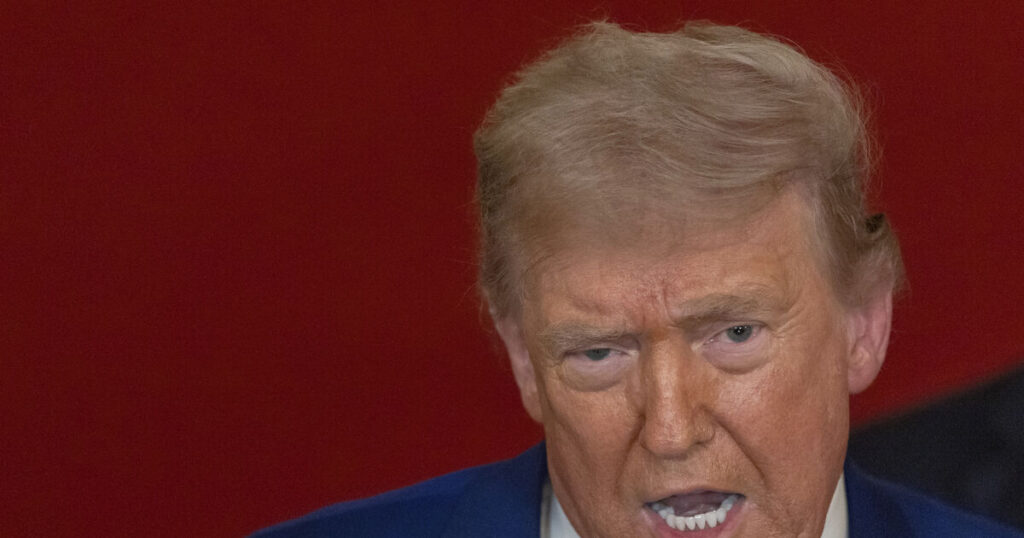President Donald Trump has called into question the future of Iran’s ruling theocracy, seemingly contradicting his administration’s earlier calls to resume negotiations and avoid an escalation in fighting.
“It’s not politically correct to use the term, ‘Regime Change,’ but if the current Iranian Regime is unable to MAKE IRAN GREAT AGAIN, why wouldn’t there be a Regime change???” Mr Trump posted on social media. “MIGA!!!”
The posting on Truth Social marked something of a reversal from defence secretary Pete Hegseth’s Sunday morning news conference that detailed the aerial bombing on three of the country’s nuclear sites.
“This mission was not and has not been about regime change,” Mr Hegseth said.
“The damage to the Nuclear sites in Iran is said to be “monumental.” The hits were hard and accurate. Great skill was shown by our military. Thank you!” –President Donald J. Trump pic.twitter.com/BJQPHa7XT6
— The White House (@WhiteHouse) June 22, 2025
Secretary of state Marco Rubio warned on Fox News that any retaliation against the US or a rush toward building a nuclear weapon would “put the regime at risk”.
Mr Trump’s warning to Iran’s leadership comes as the US has demanded that Iran not respond to the bombardment of the heart of a nuclear programme it spent decades developing.
The Trump administration has made a series of intimidating statements even as it has simultaneously called to restart negotiations, making it hard to get a complete read on whether the president is simply taunting an adversary or using inflammatory words that could further widen the war between Israel and Iran that began earlier this month.
Up until the president’s post on Sunday afternoon, the coordinated messaging by Mr Trump’s vice president, Pentagon chief, top military adviser and secretary of state suggested a confidence that any fallout would be manageable and that Iran’s lack of military capabilities would ultimately force it back to the bargaining table.
Mr Hegseth had said that America “does not seek war” with Iran, while Vice President JD Vance said the strikes have given Tehran the possibility of returning to negotiate with Washington.
But the unfolding situation is not entirely under Washington’s control, as Tehran has a series of levers to respond to the aerial bombings, which could intensify the conflict in the Middle East with possible global repercussions.
Iran can block oil being shipped through the Strait of Hormuz, attack US bases in the region, engage in cyber attacks or double down on a nuclear programme might seem like more of a necessity after the US strike.
Mr Trump, who had addressed the nation from the White House on Saturday night, returned to social media on Sunday to lambast Republican Congress member Thomas Massie, who had objected to the president taking military action without specific congressional approval.
“We had a spectacular military success yesterday, taking the ‘bomb’ right out of their hands (and they would use it if they could!)” Mr Trump said as part of the post on Truth Social.
At their joint Pentagon briefing, Mr Hegseth and Air Force General Dan Caine, chairman of the Joint Chiefs of Staff, said “Operation Midnight Hammer” involved decoys and deception, and met with no Iranian resistance.
General Caine indicated that the goal of the operation — destroying nuclear sites in Fordo, Natanz and Isfahan — had been achieved.
“Final battle damage will take some time, but initial battle damage assessments indicate that all three sites sustained extremely severe damage and destruction,” he said.
While US officials urged caution and stressed that only nuclear sites were targeted by Washington, Iran criticised the actions as a violation of its sovereignty and international law.
Iran’s foreign minister Abbas Araghchi said Washington was “fully responsible” for whatever actions Tehran may take in response.
“They crossed a very big red line by attacking nuclear facilities,” he said at a news conference in Turkey. “I don’t know how much room is left for diplomacy.”
China and Russia, where Araghchi was heading for talks with President Vladimir Putin, condemned the US military action. The attacks were “a gross violation of international law,” said Russia’s Foreign Ministry, which also advocated “returning the situation to a political and diplomatic course.”
A Turkish Foreign Ministry statement warned about the risk of the conflict spreading to “a global level”.
British Prime Minister Keir Starmer said the United Kingdom was moving military equipment into the area to protect its interests, people and allies.
His office said he talked on Sunday with Mr Trump about the need for Tehran to resume negotiations, but Mr Trump would have posted his remarks about regime change after their conversation.
The leaders of Italy, Canada, Germany and France agreed on the need for “a rapid resumption of negotiations.” France’s Emmanuel Macron held talks with the Saudi Crown Prince and the Sultan of Oman.


